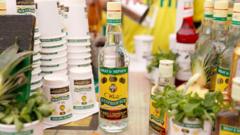The debate over what constitutes Jamaican rum is intensifying, with new regulations prohibiting overseas aging sparking legal challenges from major producers. As Jamaica aims to boost its rum's market identity, the conflict raises important questions about authenticity, local economic benefits, and cultural pride.
Defining Jamaican Rum: A Legal Battle for Authenticity and Heritage

Defining Jamaican Rum: A Legal Battle for Authenticity and Heritage
A dispute in Jamaica over rum's geographical indication highlights tensions between traditional practices and modern production methods within the Caribbean spirits industry.
The essence of Jamaican rum is under scrutiny as a legal dispute unfolds in the Caribbean, questioning what defines this iconic spirit. The clash centers around recent amendments to the geographical indication (GI) for Jamaica Rum, a designation intended to protect the island's rum-producing heritage. In October 2022, Jamaica's Intellectual Property Office (JIPO) enacted stricter regulations prohibiting the aging of Jamaican rum outside the island, following advocacy from the Spirits Pool Association (SPA), which represents Jamaica's six primary rum distilleries.
The SPA contends that a robust GI will not only elevate the recognition and marketability of Jamaican rum in Europe and the US but also protect the product against competitors. By stipulating that aging must occur on Jamaican soil, proponents argue that this ensures the rum retains its authenticity and uniqueness, thus enhancing its appeal as a premium product.
However, this revision has sparked backlash from National Rums of Jamaica (NRJ), a major player in the industry that relies on aging rum overseas. NRJ oversees Long Pond and Clarendon distilleries and is significantly impacted by the new regulations. The company argues that aging rum outside Jamaica is a long-established practice and should not be disallowed. Their critical stance underlines the complexities involved in balancing market demands with heritage conservation.
While NRJ declines further comment, the SPA's representatives emphasize the cultural significance of aging rum locally, urging that the change in regulation will ultimately benefit the Jamaican economy by keeping production processes within its borders. This includes opportunities in rum tourism and related economic activities that contribute to the local landscape.
Legal experts highlight the potential benefits of geographical indications, asserting that products can fetch higher prices and retain a strong sense of regional identity. Examples of widely recognized GIs include Scotch whisky and French champagne, showcasing the potential for economic and cultural enrichment.
As Jamaica contemplates its path forward regarding GI classification, the ongoing contention echoes a similar situation in Barbados, where discussions over its own rum GI reveal shared challenges within the Caribbean community. Furthermore, stakeholders in Barbados are concerned about the potential dilution of a distinct product identity, emphasizing the crucial link between rum production and national heritage.
The SPA hopes that an amicable resolution can be reached amidst these tensions, acknowledging the need for both parties to compromise as they navigate their way through these evolving discussions. The issue reinforces the importance of preserving the integrity of products synonymous with Jamaica's identity, particularly as it strives for acclaim in a global market where competition is fierce.



